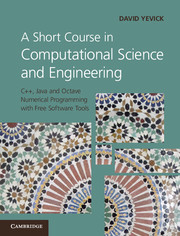 A Short Course in Computational Science and Engineering
A Short Course in Computational Science and Engineering Book contents
- Frontmatter
- Contents
- Chapter 1 Introduction
- Chapter 2 Octave programming
- Chapter 3 Installing and running the Dev-C++ programming environment
- Chapter 4 Introduction to computer and software architecture
- Chapter 5 Fundamental concepts
- Chapter 6 Procedural programming basics
- Chapter 7 An introduction to object-oriented analysis
- Chapter 8 C++ object-oriented programming syntax
- Chapter 9 Arrays and matrices
- Chapter 10 Input and output streams
- Chapter 11 References
- Chapter 12 Pointers and dynamic memory allocation
- Chapter 13 Memory management
- Chapter 14 The static keyword, multiple and virtual inheritance, templates and the STL
- Chapter 15 Creating a Java development environment
- Chapter 16 Basic Java programming constructs
- Chapter 17 Java classes and objects
- Chapter 18 Advanced Java features
- Chapter 19 Introductory numerical analysis
- Chapter 20 Linear algebra
- Chapter 21 Fourier transforms
- Chapter 22 Differential equations
- Chapter 23 Monte Carlo methods
- Chapter 24 Partial differential equations
- Index
Chapter 10 - Input and output streams
Published online by Cambridge University Press: 05 June 2012
- Frontmatter
- Contents
- Chapter 1 Introduction
- Chapter 2 Octave programming
- Chapter 3 Installing and running the Dev-C++ programming environment
- Chapter 4 Introduction to computer and software architecture
- Chapter 5 Fundamental concepts
- Chapter 6 Procedural programming basics
- Chapter 7 An introduction to object-oriented analysis
- Chapter 8 C++ object-oriented programming syntax
- Chapter 9 Arrays and matrices
- Chapter 10 Input and output streams
- Chapter 11 References
- Chapter 12 Pointers and dynamic memory allocation
- Chapter 13 Memory management
- Chapter 14 The static keyword, multiple and virtual inheritance, templates and the STL
- Chapter 15 Creating a Java development environment
- Chapter 16 Basic Java programming constructs
- Chapter 17 Java classes and objects
- Chapter 18 Advanced Java features
- Chapter 19 Introductory numerical analysis
- Chapter 20 Linear algebra
- Chapter 21 Fourier transforms
- Chapter 22 Differential equations
- Chapter 23 Monte Carlo methods
- Chapter 24 Partial differential equations
- Index
Summary
C++ implements a device-independent approach to reading and writing data such that nearly the same interface (the public class members) is employed to send data to or receive data from different devices such as disk files, memory buffers and the keyboard and terminal. This is achieved by collecting functions and variables common to all input and output operations into an ios base class. Operations involving the standard input device (keyboard) cin are appended in a derived istream class, while functionality that enables data to be read from files and memory buffers is incorporated in the ifstream and istrstream subclasses of istream, respectively. Output operations are implemented in the same manner by the corresponding output classes, ostream, ofstream and ostrstream. The iostream class multiply inherits the internal functions and variables of both the istream and ostream classes. Finally, the fstream and strstream classes further specialize the iostream class by appending the properties required to both read and write to files and memory buffers (alternatively e.g. fstream can multiply inherit from ofstream and ifstream). Following the structure of the inheritance diagram, we first discuss the iostream class. Subsequently we discuss the interfaces to files and memory buffers associated with fstream and strstream.
The iostream class and stream manipulators
In C++, variables read into or written from a program initially reside in abstract objects termed streams, examples of which are cin and cout. These streams may be thought of as smart memory buffers enhanced through the inclusion of public, user-accessible functions that can act on the data stored in the stream buffer before its contents are processed by the program or sent to a device. The components that interface the memory buffer with the actual system devices are implemented as private functions and variables of the stream classes and are invisible to the user.
- Type
- Chapter
- Information
- A Short Course in Computational Science and EngineeringC++, Java and Octave Numerical Programming with Free Software Tools, pp. 93 - 100Publisher: Cambridge University PressPrint publication year: 2012


